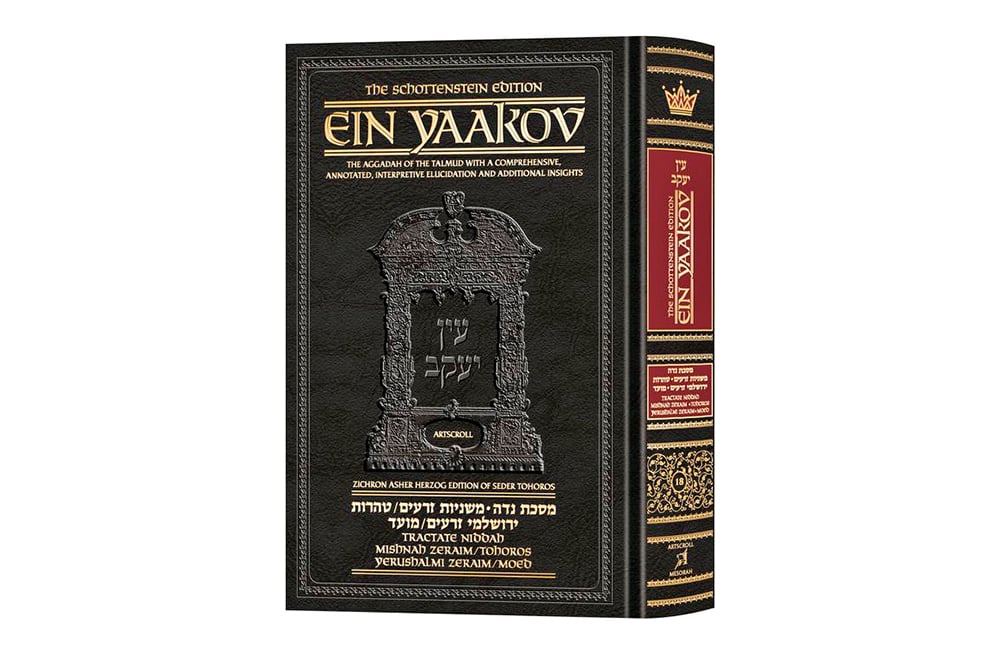
Excerpting: “The Schottenstein Edition of Ein Yaakov – Volume 18.” ArtScroll / Mesorah. 2025. ISBN-10: 1422642879.
(Courtesy of Artscroll) Insight to Yerushalmi Megillah Chapter 1, Mishnah 2 (daf 18a): The Gemara states that Nachum bar Simai was referred to as the “son of holy ones” because of his practice not to gaze upon the image engraved on a coin. While the Gemara is certainly to be understood in its literal sense, several of the Chassidic masters have offered homiletic interpretations of this passage that shed light on what should be the proper attitude toward blessings such as wealth and yichus (distinguished lineage).
R’ Yisrael Hager, the Ahavas Yisrael of Vizhnitz, observes that there are two types of mindsets that one can have with regard to his money. One approach is to appreciate the role money has in fulfilling Hashem’s will. A person who has this attitude views his wealth as a means for spiritual growth. His money is valuable to him because he can use it to perform countless mitzvos, such as donating charity, supporting Torah scholars, and extending loans to those in need. The second type of attitude is to admire one’s wealth just for its own sake. Such a person would enjoy simply looking at his money and take pleasure in the mere fact that he owns it. When the Gemara says that R’ Nachum bar Simai did not look at the image on a coin, it means that he did not fall into the trap of viewing his money as an end in itself. His refusal to gaze at coins was an expression of his firm recognition that his money had value only because of the good that could be done with it.
The Ahavas Yisrael explains further that the same lesson applies to the approach one should take toward his yichus. A person who descends from illustrious ancestors can simply take pride in his inherited status, feeling that this alone grants him superiority over his fellows. Such a person is akin to the wealthy man who lovingly gazes at his money, thinking that it in itself confers upon him prestige. However, the wise man realizes that yichus, much like money, is a gift that is meant to be used primarily in the service of Hashem. A person who possesses distinguished lineage must become worthy of it, by viewing it as an impetus that spurs him to reach for greater heights himself. The wonderful deeds of his parents and grandparents are indeed a source of merit for him — but only if he follows in their footsteps and uses his strong foundation to strive even higher (see also Shelah, Parashas Bechukosai, Derech Chaim Tochachas Mussar).
Based on this idea, we can understand why R’ Nachum bar Simai was called the “son of holy ones,” even though the Gemara is praising R’ Nachum’s own piety, not that of his ancestors. It is because he correctly perceived what it means to have eminent yichus. Although his ancestors were righteous, he did not simply admire the spiritual wealth he inherited from them and stop there. He himself aspired to greatness and sought to emulate their holy ways. R’ Nachum fully understood the implications of his noble upbringing. To him it was a source of obligation — and a means of propelling him to even greater heights of achievement. He thus truly deserved the accolade of being “the son of holy ones” (Ahavas Yisrael, Bereishis, Likkutim §51).
R’ Aryeh Leibish Halberstam, the Rebbe of Zhemigrod, offers another interpretation of why R’ Nachum bar Simai was known as the “son of holy ones.” He notes that the Aramaic term our Gemara uses here for coin is zuza. The Midrash teaches that this relates to the word zaz, which means “to move,” because money and riches do not permanently stay with a person, but constantly move from one individual to the next (Tanchuma, Mattos §6). R’ Nachum was likewise called “the son of holy ones” because he recognized that yichus works in the same manner. The illustriousness of one’s ancestors, no matter how exemplary, is no guarantee that their spiritual level will remain with him. Thus, R’ Nachum never spent time admiring the “image” of the noble lineage that preceded him. He knew that to be truly considered the son of holy ones, he could not rely on the merit of his forebears alone. He strove for greatness himself; he moved to start his own illustrious line.
Reprinted from The Schottenstein Edition of Ein Yaakov with permission from the copyright holder, ArtScroll Mesorah Publications.









